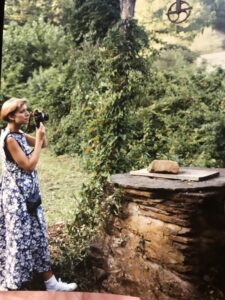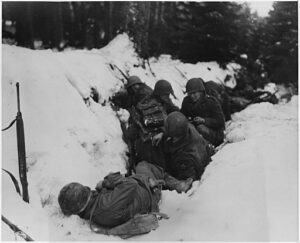They wouldn’t understand, especially the little ones.
“Daddy’s gone to heaven,” she would say. They would cry and grieve and she would find someone else.
When he opened the door, the apartment smelled of greasy chicken and diapers. Earlier in the evening he told her he’d be at Jerry’s Bar and Grill. Julie was furious, of course, so she and the kids had gone to visit her sister for a few days. He and his wife had exchanged harsh words, but Manuel felt relief. She and the kids wouldn’t be home. They wouldn’t see the carnage.
The scotch having fixed his resolve, Manuel made the call.
As his eyes adjusted to the dark, he crossed the frayed carpet, opened the closet door and removed a plank near the back wall. He hadn’t used the weapon in years, a nine millimeter Smith and Wesson that felt strangely familiar. From years on the streets he knew how to use the gun, but only killed when necessary, always in self defense, never for pleasure—unlike the monster who murdered his brother.
After prison, Manuel truly believed he could change, but his mind never stopped playing that endless loop. His brother’s face—the pleading, the tears, the anguish—would never disappear. Graven into his memory like etchings on a gravestone was the leering face of the thug who pulled the trigger.
Tonight that man would die, and Manuel would die with him.
Replacing the plank, Manuel eased along the wall to observe the rendezvous point from his perch three stories up. On the street below, his brother’s killer would step into the alley expecting an easy exchange. Bills for baggies. No problem.
But when Manuel looked down on the scene, his fists tightened around the pistol. Cops were erecting a barrier and a tarp-covered body lay in the middle of the alley.
A crime scene.
Two uniforms conversed under a streetlight. The lights of a patrol vehicle rotated across the dark bricks of nearby tenements. In the shadows something moved, something barely perceptible. Even from this distance, the thick man in the sideways baseball cap shifted easily from light to darkness, watching.
Then into the shadows the thug disappeared. The meeting would be aborted. The man who killed his brother would flee. Then, as it had so many nights before, Manuel’s cowardice would seize his thoughts and haunt another sleepless night.
Main Comments
This first page had some good things going for it, right from the get go. It was written in clear, direct prose, and was immediately personal. The reader could easily grasp that the stakes, at least for the main protagonist, were going to be high and that this story was going to be about avenging the murder of the protagonist’s brother. That helped create some nice tension right from the start, but for me, this first page suffered from a lack of specificity and grounding, that made the story, even though it was going to be high stakes and personal, feel almost generic.
In terms of lack of specificity, I wanted more detail about the main protagonist to set him apart. I wanted to be able to picture him, get a hint of intrigue (why had he been in prison for example?) and to hear a more realistic internal dialogue that made him feel like a real person – one I immediately felt sympathy for, and whose story created the kind of dramatic tension that could sustain a novel.
In terms of grounding, I wanted more details to be able to picture the apartment and the building – especially as it seemed such an easy vantage point from which he could have killed the ‘thug’ in the past (had he tried before? – this wasn’t clear).
Specific Comments/Feedback
Having mused over the best way to provide constructive feedback regarding this first page, I decided that providing further comments/notes in bullet form as I read the first page was probably the most useful. So here goes:
- First line – ‘They wouldn’t understand, especially the little ones’ had me intrigued. But then, just as I was thinking about the children (and we never find out how many or their names, or ages), the comment ‘they would cry and grieve and she would find someone else’ suddenly seemed cold and rather flippant. I wanted to know more about his relationship with his children and their mother (who was, I assumed his wife) but was a little put off already.
- We get a brief description of the apartment but nothing more. I wanted to be able to visualize the place, and feel grounded in the surroundings. Where are we? What is the socio-economic background of this family? (they sound poor but then he drinks scotch in the next paragraph which doesn’t seem consistent with this initial impression). I’m assuming Julie is his wife but why had they exchanged harsh words – was it because he was always at Jerry’s Bar and Grill (and here, the name is specific but seems unnecessary since I have no other information or context regarding all the other surroundings). Also ‘carnage’ is a very strong word and it makes me think of a large scale, mass killing.
- Now Manuel makes the call – but I’m not sure what this means as we haven’t got the backstory or context yet – but I’m willing to go with it.
- Then we have a paragraph about him getting his weapon out and again, we get specifics about it (9 millimeter Smith & Weston) but few specifics about his past. He always killed in self-defense? Why? How did he know the monster who murdered his brother killed for pleasure? I need more here to be invested in this story.
- ‘After prison’ – again, we get a hint of a past/backstory but no details, except about his brother (who, as yet, remains nameless). The line ‘graven into his memory…” would work better if I had more details so I could really visualize the scene.
- ‘Tonight that man would die, and Manuel would die with him’ – Why, if he’s shooting the man from the vantage point of a window three stories up, would Manuel have to die? This didn’t quite make sense without more context and information on what Manuel was planning. It sounds like he wasn’t going to be the one going to make the exchange below (as he is upstairs) but how is the exchange supposed to work exactly (?) – and how did Manuel know all this (had he set it up? I couldn’t tell by the end if he had, or if these kind of exchanges were just a frequent occurrence in the alley and Manuel had finally got the courage to try and kill the ‘thug’ this time (?) (again, this reveals lack of grounding and specificity to me).
- Now, when Manuel looks down on the scene he sees cops…but didn’t he hear sirens or see the flashing lights as he walked across the dark room towards the closet in the previous paragraph?
- So it’s a crime scene, but we have no context for it – and now a man is watching from the shadows but the police are clueless(?) There’s a reference to nearby tenements but again I can’t picture the scene, as I haven’t got any description or point of reference for where we are.
- The final paragraph has the ‘thug’ disappear (which seems too easy given the police presence), and ‘then, as it had so many nights before, Manuel’s cowardice would seize his thoughts and haunt another sleepless night’. I really liked this last line, but it still confused me as I don’t have context for his previous attempts or the past that links him to the thug and the circumstances surrounding his brother’s murder.
As all these comments reveal, this first page really needs more specific details and a clear description of place, backstory, and characters to come to life for me, and to create the tension needed for me to turn the page and keep reading. That being said, the scene itself is a compelling one – a man risking everything to avenge his brother’s death – and our brave submitter no doubt knows all the details that could easily be added to bring color and tension to this story. Overall, most of my comments/recommendations are a relatively easy fix and I think once we get the specificity and grounding we need as readers, this first page could be the start of a something good.
So, TKZers, what comments or feedback do you have for our brave submitter?







